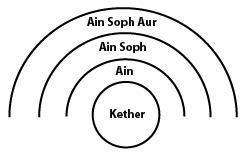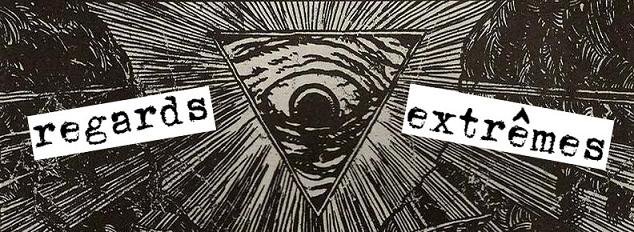
Ain is within the Kabbalah the concept of Nothingness from which everything emanates. It was first brought forth by Sephardi Jews during 12th century under the influence of neoplatonism and sufi mysticism. The concept is well mystified by the rabbis and learned men since then under the claims of being ungraspable. Ain is everything and nothing, the great in the small, both macro- and microcosm, neither active nor passive and so on. Those versed in the jargon of mysticism can relate better to these definitions of Ain, but those new to mysticism will have many questions regarding the nature and properties of Ain. In this text I will try an apophatic approach to Ain in hopes to shed some light on it.
It is very difficult for us to imagine something absolute (let alone a Divine Absolute) due to various reasons. Some might say our consciousness isn't evolved enough, that we only use 10% of our brains and if we would use the rest then we would be able to grasp it. The notion that we only use 10% of our brain is false not only from a neurological perspective but also from an evolutionary one. Why would we develop a brain of that size if we'll only use 10% of it. It makes no sense. Others will claim that we are not meant to grasp the Absolute. There is a reason why God is beyond our senses and we are but species with limitations. We are not supposed to (at least by default) be able to imagine it. So the image of a bearded old man is but a poor attempt to imagine the Absolute. Just as we'd try to imagine how traveling through a black hole would be. Empirically speaking it's difficult enough to actually locate a black hole, let alone travel through it. But let's get back to Ain. The apophatic approach implies describing something by negations, that is by what that speciffic something is Not.
There are two types of nothingness or void or emptiness. One is the graspable one and the other is Ain. The first one is simple to define since it bases upon the premise that it exists because of the lack of something. Imagine a room that has No-Thing in it. No furniture, no carpets, no pictures on the walls. We call it an empty room since it's supposed to inhabit something, some properties. Or we say that the room is void (of things) or that it has nothing in it. This is thus a graspable nothingness. We can imagine it. Even if we close our eyes we can say that we see nothingness. That can be explained in two different ways. The nothingness because the lack of reality - created by the deprivation of light hitting our retinas and thus creating reality. Another is that the nothingness or void we see when we close our eyes is often blackness. Or we imagine nothingness to be total blackness or sometimes total whiteness. Black and white are achromatic, that is they are non-colours, which means what we imagine as nothingness (black or white) is a lack of colour. Our graspable envisioning of nothingness is grounded thus in the idea that nothingness is a lack of something.
Ain is not that kind of nothingness. It is not of an instrumental validity as the former - that is, it only exists because one has taken something from it and it will cease the moment one adds something to it. The nothingness, void or emptiness of Ain is axiomatic. It is nothingness in, through and out of itself and that is why we cannot imagine it. While this does not make it clearer how to imagine Ain, it does make it clearer how not to do it. It is perhaps of no small surprise that we cannot envision Ain. We are after all not an absolute species, we evolve constantly. Ain on the other hand is unchangeable. It cannot be divided, multiplied or counted. On the other hand it is not impossible that we can be able to get nearer understanding it through various mystical techniques of counsciousness change, but we will never be able to fully grasp it in its entirety.

